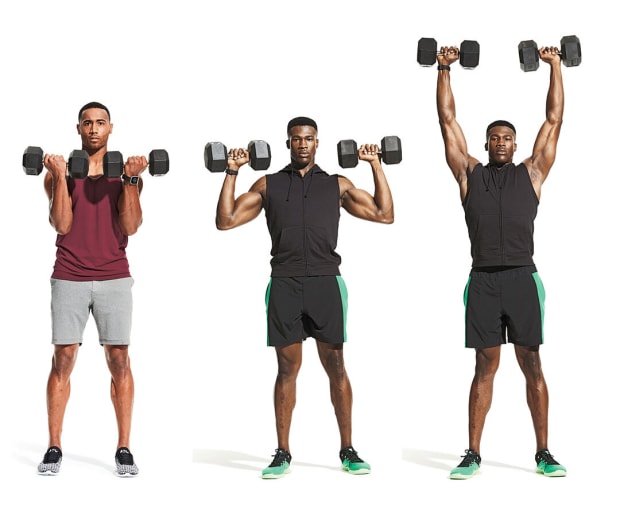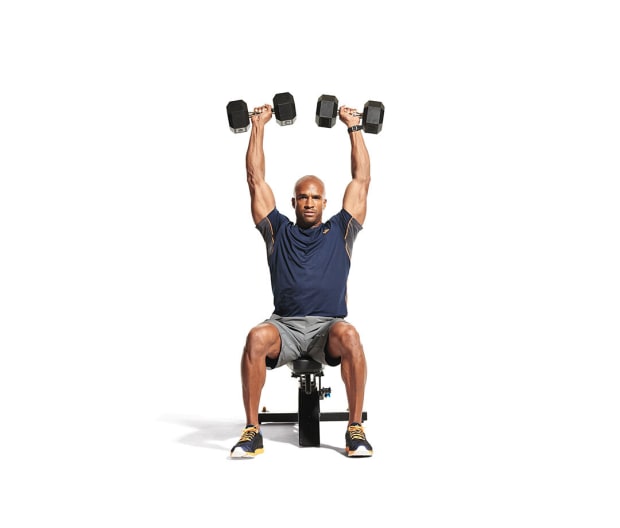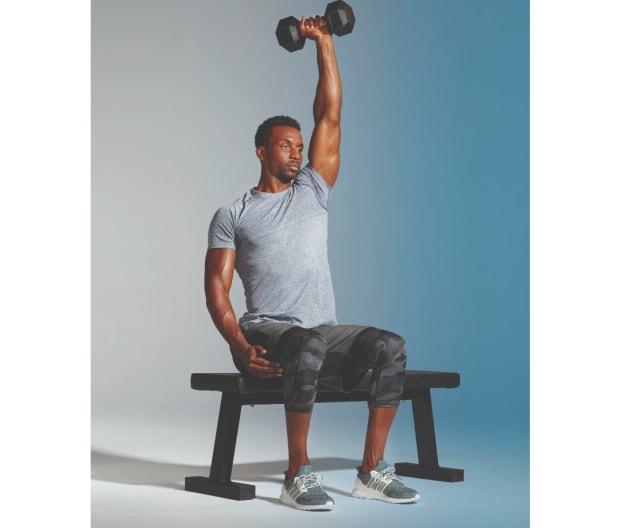How to Do an Arnold Press, the Ultimate Shoulder Builder
[ad_1]
The Arnold press strengthens the deltoids like no other shoulder exercise. Here’s how to do it like its namesake.
Any lift named for a bodybuilder who used his broad shoulders to win seven Mr. Olympia titles and launch an epic film career that took him to the California governor’s mansion has instant credibility. Arnold Schwarzenegger invented the Arnold press to work all three heads of the deltoids in one move to produce better muscle development and strength and bring more efficiency to his workouts.
Essentially a dumbbell press variation that takes you through a fuller range of motion, the move has stood the test of time nearly half a century later.
Arnold Press Benefits
Lateral raises can only get you so far. Instead of performing three different shoulder exercises, which would take longer and likely result in asymmetrical muscle growth, this three-in-one move hits everything equally and simultaneously.
Schwarzenegger was ahead of the curve when he invented this exercise. It came before compound movements became the norm—saving time and adding efficiency to workouts.
Since the dumbbell Arnold press strengthens and stabilizes the shoulders, it helps you perform better in other lifts and bulk the muscles to look better in a T-shirt. Anyone who came across one of Schwarzenegger’s many bodybuilding books in the 1980s no doubt benefitted from this staple exercise.
What Does an Arnold Press Work?
The Arnold press targets all three heads of the deltoids: anterior, mediolateral, posterior. It’s less likely to cause shoulder impingement than the shoulder press. That’s important in an era when most of us spend hours hunched over steering wheels and computers, which rounds our shoulders and can cause the rotator cuff to catch on nearby tissue and bone when you lift your arm.
By taking the shoulders through all three planes of motion, the Arnold press improves shoulder stability and decreases the potential for injury. Though the Arnold press is a shoulder exercise, the upper back and biceps play a secondary role in the movement.

James Michelfelder
How to Do an Arnold Press
- Sit upright either at the end of a flat bench or leaning against the back of an incline bench holding dumbbells in each hand resting on the tops of your thighs, palms in. You can also stand (shown above).
- If sitting, kick your knees up to assist bringing the weights into the start position: Arms bent at 90 degrees, palms facing you, as if at the end of a biceps curl. If standing, curl the dumbbells.
- Inhale and squeeze your shoulder blades together at the start of the lift to ensure proper alignment and posture.
- Exhale as you press the dumbbells up while rotating your palms to face out. Your elbows should move laterally to move the weights in one continuous motion.
- Stop once the weights are overhead, before your arms are fully locked out, biceps close to ears.
- Pause at the top, then reverse the movement to lower.
How to Add an Arnold Press Into a Workout
As an upper-body push, the Arnold press fits seamlessly into chest and back workouts. Its efficient, three-in-one structure gives you a lot of bang for your buck. Because of its role in stabilizing the shoulders, it’s also an effective warmup exercise with little or no weight to help reset your posture, especially if you’ve already spent much of the day driving or behind a desk.

James Michelfelder
How to Make an Arnold Press Easier
The seated Arnold press is easier than the standing version since seated does not require the back muscles for stabilization. Though by sitting against an incline bench, this variation tends to work the shoulders harder. Use lighter weights and increase weight slowly to help focus on proper form and shoulder stabilization.

Justin Steele
How to Make an Arnold Press Harder
To make it harder, try a single-arm press (aka alternating Arnold press). Though the standing Arnold press variation is more challenging than the seated, some consider the standing version to be the classic method and not technically a variation.
[ad_2]
Source link


